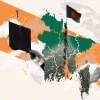From classroom to martyrdom: A tribute to the fallen HSC examinees

Every year, as the results of the Higher Secondary Certificate (HSC) exams get published, the media features bright-eyed successful students with their proud parents and/or teachers. This year, it was different. HSC examinees who lost their lives during the July uprising made the headlines. The studies that defined them as students or university applicants bore a broader meaning. They are the young revolutionaries whose sacrifices have made changes possible and led us to reflect on the paradoxes of life and death.
These martyred students achieved more in the years that they lived than many of us would do in decades. The breadth of their lifespan does not include the depths of their dying or the meaning they gave to their own lives. Their purposeful existence, though not long in years, was rich enough to defy death's physical limits. Their deaths strip away the triviality often associated with examinations and youthful aspirations, as their academic successes serve as reminders not only of unrealised potential but also of poignant sacrifices that lend new weight to the freedoms we may take for granted. Their GPA scores now stand as symbolic markers of their existential struggle against a system they deemed unjust. These students have become part of a larger narrative that transcends individual loss. By reflecting on their contributions, we can understand how death both shapes and defines life—both now and in the future.
The omnipresence of death is a core belief in almost all religions. Without an awareness of the inevitable end of our physical life, the metaphysical union with our maker would lose its significance. The Islamic belief regards martyrdom as a sacred act, granting the departed a special place in paradise. This glorification of death eases grief by transforming a loss into an act of spiritual victory. Similarly, Hinduism and Buddhism view death within the larger cycle of Samsara, where life and death are interwoven in an endless sequence of births, deaths, and rebirths. This circularity allows death to be accepted as a form of transition. Conversely, to think of death transformed into something beyond its inherent finality is central to Bardo Thodol, or the Tibetan Book of the Dead. The transitional state, bardo, is where the soul wanders through various stages of consciousness before reaching rebirth or liberation. In bardo, reality becomes fluid, subject to distortions and projections shaped by the mind's own fears, desires and attachments.
The HSC results of those who have left us can be interpreted as a type of bardo for the living—the families and communities still grappling with the loss. No words are enough to console the grieving parents and loved ones. The pain of separation for them is excruciatingly real and concrete. Yet, the meaning of these students' lives is paradoxically illuminated through their deaths. While their near ones look at the vacant chair at the dinner table or the absence of sibling rivalry, we look at their unfulfilled dreams and grant their stories an eternal quality, glorifying their defiance against formidable opponents.
The posthumous announcement of the exam results functions as a simulacrum—a representation that hints at a reality that is no longer accessible. The young ones are not with us to claim their achievements. Their successes have become a kind of "hyperreality," where the meaning of their education and potential is magnified by the tragedy of their deaths. It is as though they died to give meaning to the very concept of life itself, asserting that life's worth is not measured by longevity or conventional milestones, but by the depth of one's commitment to an ideal, even at the cost of one's existence.
Then again, the crest of their success rests on the trough of a revolutionary wave that forms our political history. A revolution needs many waves to reach the shore. To think of the sacrifices of only one generation as the sole grand narrative would be a disservice to the other sacrifices that went into the fight to overthrow autocratic regimes, whether in 1990, 1971, or beyond. The stories we choose to highlight reveal much about our national character. When a revolutionary leader like Matia Chowdhury dies without receiving due recognition, we overlook her contribution to "Bangladesh 1.0". By denying her the honour of being buried as a national hero, we falsify our history.
We have pressed a "reset button" as if to suggest that history (re)originated on August 5, 2024. If we forget the leaders and the dates that defined the foundation of our nation, we are denying the sacrifice of those who gave us our national flag and territory. If we pick only our recent heroes, then we risk picking up dead flowers to place in the vase of our history, disconnected from the tree that birthed many such flowers throughout the twists and turns of our history. "Reset" is a term more applicable to machines and artificial intelligence. For organic life or human intelligence, we need to be appreciative of the nuances of both life and death. Erasing history is a crime for which the fallen government has paid heavily. There is no sense in repeating the same mistake. I look at the pictures of those bright-eyed faces who had the potential to become so many things. Yet they became the guiding lights for us so that we don't lose our way in blind hatred and revenge.
Dr Shamsad Mortuza is professor of English at Dhaka University.
Views expressed in this article are the author's own.
Follow The Daily Star Opinion on Facebook for the latest opinions, commentaries and analyses by experts and professionals. To contribute your article or letter to The Daily Star Opinion, see our guidelines for submission.

 For all latest news, follow The Daily Star's Google News channel.
For all latest news, follow The Daily Star's Google News channel. 










Comments